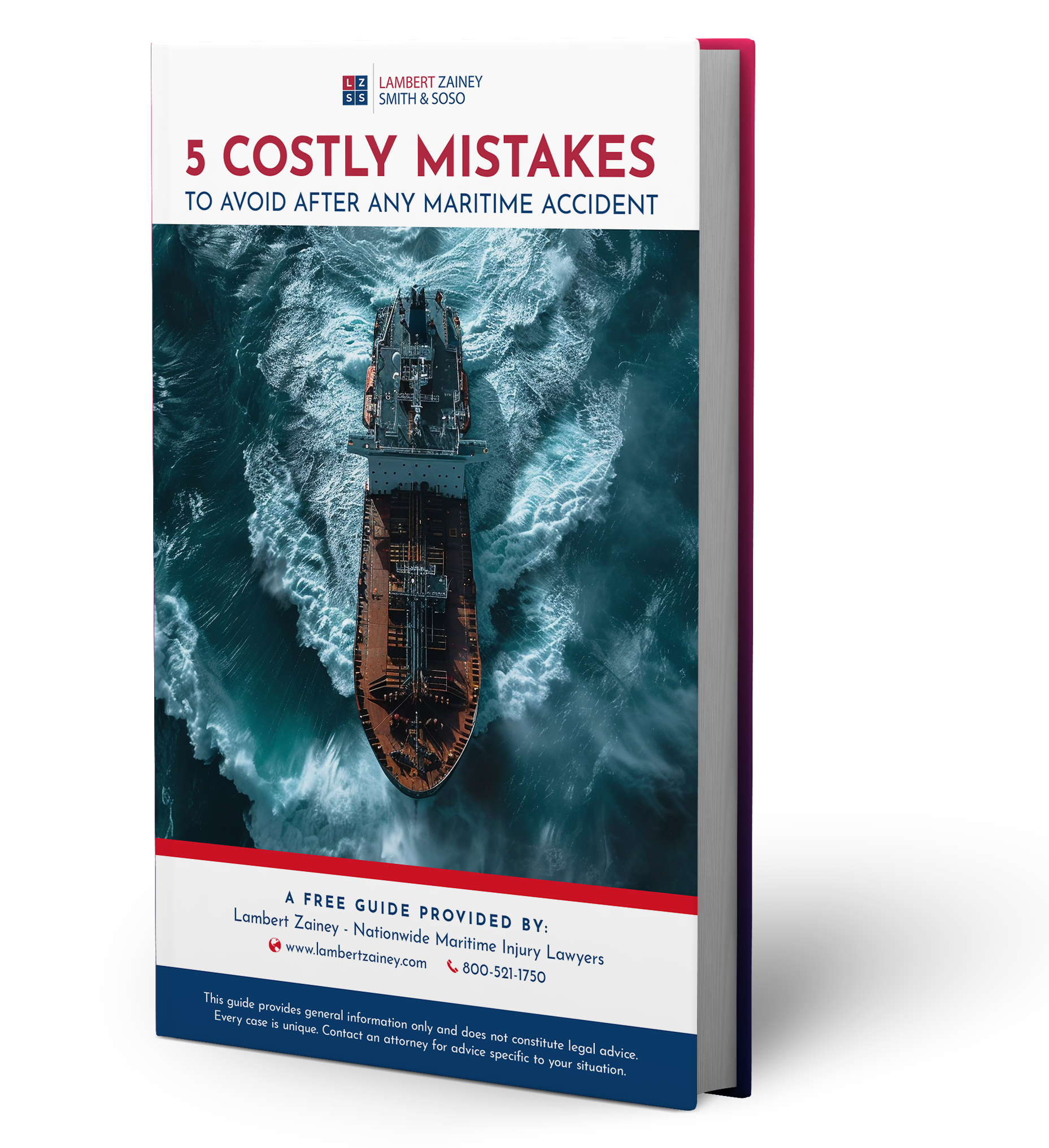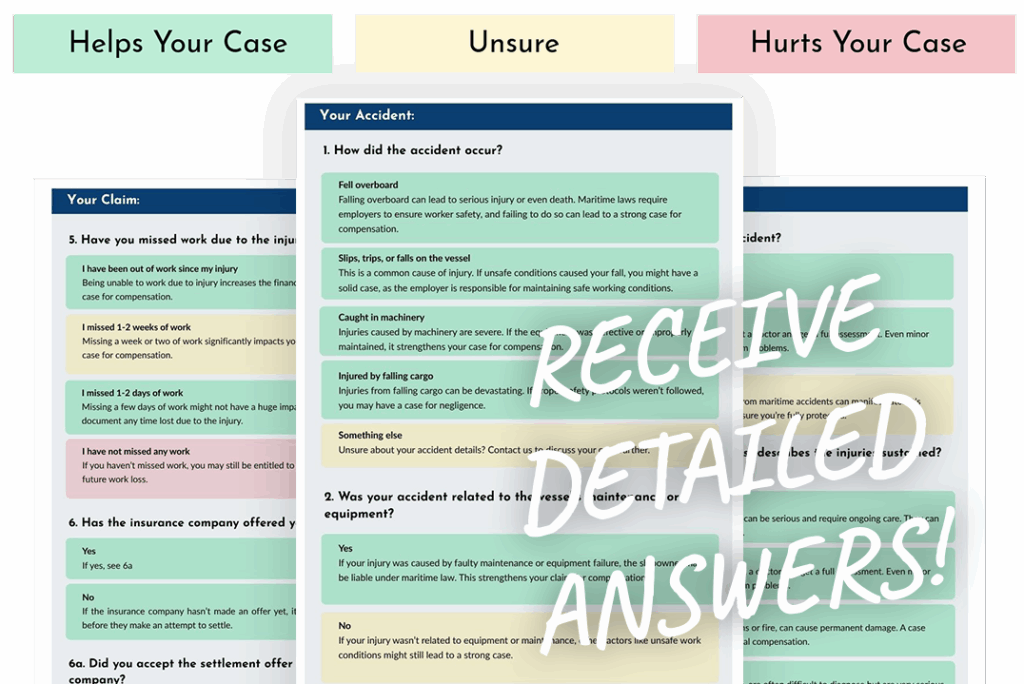The Merchant Marine Act of 1920, more commonly referred to as the Jones Act, allows a seaman who has been injured on the job to recover “maintenance” and “cure” benefits from their employer. They can collect these benefits even if their employer was not negligent for their injuries or if the vessel was not unseaworthy; in order to qualify, the seaman just has to prove that their injuries occurred in the course and scope of their employment, while they were in service of the vessel.

The injured seaman is entitled to collect these benefits until a physician determines the injured worker has reached a point called “maximum medical improvement”. If an employer refuses to pay maintenance and cure benefits, the injured seaman has a right to file a lawsuit to recover these benefits.
What Are Maintenance and Cure Benefits?
“Maintenance” benefits cover a seaman’s living expenses after an on-the-job injury. These expenses often include:
“Cure” benefits cover a seaman’s medical expenses. These expenses can include:
Maximum Medical Improvement and the Termination of Maintenance and Cure Benefits
An injured maritime worker is qualified to collect maintenance and cure benefits until they reach a point of Maximum Medical Improvement (MMI). According to the Jones Act, Maximum Medical Improvement occurs when a physician determines the injured seaman’s condition cannot be improved any further and treatment options have been exhausted. At this point, maintenance and cure benefits can be terminated.
Unfortunately, just because an injured seaman has reached MMI does not necessarily mean he or she no longer requires medical care. Maximum Medical Improvement means there is nothing a physician can do to improve the seaman’s injuries. This may be fine if the injury is a temporary medical condition, but what if a seaman’s accident has resulted in a permanent injury, such as paralysis, where no further improvement is expected and there are no treatment options for a full recovery? In this case, the seaman would reach MMI soon after the accident, at which point their maintenance and cure benefits could be terminated, even though they will require medical care for their rest of their lives.
Get Our FREE Guide to Protect Your Claim
What you do after an accident is critical. Insurance companies will try to get you to make mistakes that can hurt your claim. Our free guide can help you avoid these traps.
Download our complimentary guide: “5 Costly Mistakes to Avoid After Any Maritime Accident” to arm yourself with the knowledge you need to protect your rights.
An Experienced Maritime Attorney May be Able to Help
Employers want to provide maintenance and cure benefits for as short a time period as possible. In some cases, they seek to terminate benefits before the worker has fully recovered from their injuries. If you are a maritime worker who was injured on the job and you believe your benefits were cut off before you were fully ready to return to work, a maritime injury attorney may be able to help you.
Since the 1970s, the New Orleans maritime lawyers at Lambert Zainey have helped injured maritime workers all over the U.S. obtain the compensation they deserve for the pain and suffering caused by their injuries. If you feel your employer has cut off maintenance and cure benefits prematurely or if you suffered injuries that will affect your life and livelihood beyond what maintenance and cure covers, please contact the Lambert Firm at (800) 521-1750 to schedule a free consultation with one of our offshore injury lawyers.
The Merchant Marine Act of 1920, more commonly referred to as the Jones Act, allows a seaman who has been injured on the job to recover “maintenance” and “cure” benefits from their employer. They can collect these benefits even if their employer was not negligent for their injuries or if the vessel was not unseaworthy; in order to qualify, the seaman just has to prove that their injuries occurred in the course and scope of their employment, while they were in service of the vessel.

The injured seaman is entitled to collect these benefits until a physician determines the injured worker has reached a point called “maximum medical improvement”. If an employer refuses to pay maintenance and cure benefits, the injured seaman has a right to file a lawsuit to recover these benefits.
What Are Maintenance and Cure Benefits?
“Maintenance” benefits cover a seaman’s living expenses after an on-the-job injury. These expenses often include:
“Cure” benefits cover a seaman’s medical expenses. These expenses can include:
Maximum Medical Improvement and the Termination of Maintenance and Cure Benefits
An injured maritime worker is qualified to collect maintenance and cure benefits until they reach a point of Maximum Medical Improvement (MMI). According to the Jones Act, Maximum Medical Improvement occurs when a physician determines the injured seaman’s condition cannot be improved any further and treatment options have been exhausted. At this point, maintenance and cure benefits can be terminated.
Unfortunately, just because an injured seaman has reached MMI does not necessarily mean he or she no longer requires medical care. Maximum Medical Improvement means there is nothing a physician can do to improve the seaman’s injuries. This may be fine if the injury is a temporary medical condition, but what if a seaman’s accident has resulted in a permanent injury, such as paralysis, where no further improvement is expected and there are no treatment options for a full recovery? In this case, the seaman would reach MMI soon after the accident, at which point their maintenance and cure benefits could be terminated, even though they will require medical care for their rest of their lives.
Get Our FREE Guide to Protect Your Claim
What you do after an accident is critical. Insurance companies will try to get you to make mistakes that can hurt your claim. Our free guide can help you avoid these traps.
Download our complimentary guide: “5 Costly Mistakes to Avoid After Any Maritime Accident” to arm yourself with the knowledge you need to protect your rights.
An Experienced Maritime Attorney May be Able to Help
Employers want to provide maintenance and cure benefits for as short a time period as possible. In some cases, they seek to terminate benefits before the worker has fully recovered from their injuries. If you are a maritime worker who was injured on the job and you believe your benefits were cut off before you were fully ready to return to work, a maritime injury attorney may be able to help you.
Since the 1970s, the New Orleans maritime lawyers at Lambert Zainey have helped injured maritime workers all over the U.S. obtain the compensation they deserve for the pain and suffering caused by their injuries. If you feel your employer has cut off maintenance and cure benefits prematurely or if you suffered injuries that will affect your life and livelihood beyond what maintenance and cure covers, please contact the Lambert Firm at (800) 521-1750 to schedule a free consultation with one of our offshore injury lawyers.









